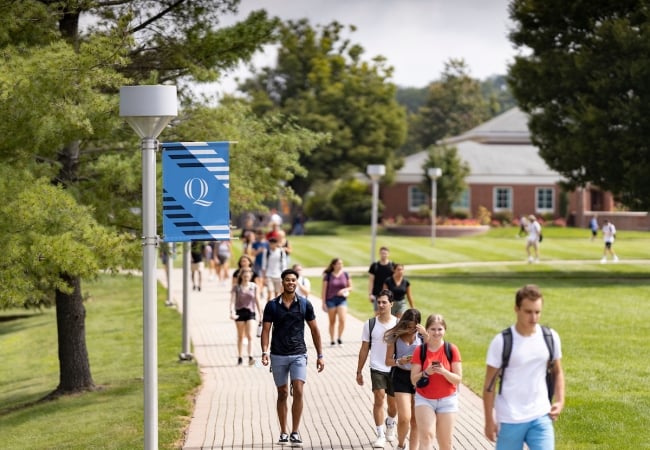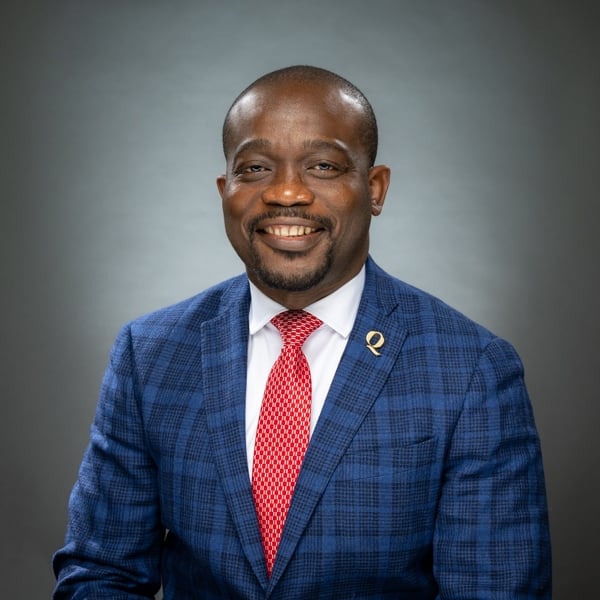You have /5 articles left.
Sign up for a free account or log in.

A new hire to Quinnipiac University puts a spotlight on career development and experiential learning opportunities at the institution.
Autumn Driscoll/Quinnipiac University
Kafui Kouakou grew up knowing he’d have a career in education. During his childhood in Togo, West Africa, Kouakou’s father created and led private high schools, and it was understood that Kouakou would either become an educator or work in his father’s schools. After moving to the U.S. for his undergraduate degree, Kouakou became enamored with the structures of higher education and became an administrator himself.

Kafui Kouakou, assistant vice president of career development and experiential learning at Quinnipiac University
Quinnipiac University
Now, as the new assistant vice president of career development and experiential learning for Quinnipiac University in Connecticut, Kouakou leads strategic work to help students build skills for their future jobs and identify external partners to deliver those opportunities.
Kouakou spoke with Inside Higher Ed about his work at Quinnipiac since January 2023, the need for experiential learning for students and how the university’s new organization better supports this goal.
Q: What led you to a career in higher education?
A: Initially, I wanted to become a faculty [member] in economics. But I joined student government during my undergraduate and graduate studies and became the chair of the university Student Senate at my alma mater, the City University of New York. Sitting as the chair of the Senate, as well as being a member of the Board of Trustees at the time, gave me a different view of what higher education is. It’s so complicated, complex, this giant puzzle that needs to … fit together, keep evolving. I was so intrigued by it that I said, “You know what? I really want to do this as a career.”
But my particular focus on experiential learning is really tied to my experience graduating with my bachelor’s degree. I applied for hundreds of jobs and couldn’t get a job, maybe two interviews. And the catch-22 question we get is “What experiences do you have?” and then I’m like, “Well, I was too busy trying to get a good grade—that I was asked to get—so I can get the job.”
And then, at that moment, I realized there’s something that was missing in the equation. At the time, I didn’t know it was experiential learning as a bigger umbrella, but I started to pay more attention to all the things that I needed to be doing. So I went back for a second degree, and that’s really when my career in higher ed really took off because of that personal experience. And then I decided, “What can I do to make sure students don’t go through that similar experience that I have, so they know what they need to be doing ahead of time, so they can be successful right out the gate?” This became a passion of mine, and that’s why I do the work that I do.
Q: You mentioned sometimes students don’t know that they need experiential learning or they’re unaware of their experiential learning. Where do you think that stems from?
A: Traditionally, when you think about college, college is really a place where you are told you need to get an education. And part of that education is “You need to go to class, get good grades”; GPA is a major key factor in that. A lot of students put a lot of attention on that, because they view career as something that is farther down in the future and then worry about that when they get there.
Unfortunately, that is not the case. You have to include the skill, building the competencies, building the experiences that you need to [have] along the way in order to be successful right out of the gate … I was so focused on getting good grades that I did not build enough repertoire when it comes to the experience to be able to be successful.
I think that disconnect is still there to some extent, at some level, but a lot of institutions, including Quinnipiac, have done a great job at trying to make sure we promote the fact that, “No, you can’t wait until your senior year to try to get an internship; you need to start to build the competencies and skill to get the internship earlier … so when an employer looks at you, they know that you have all the tools you need to be successful on the job.”
Q: In your new role, what’s included under your purview?
A: We have nine different schools that are part of the university, and traditionally, each school has always had a career development staff member, either an assistant dean, associate dean or director level, who is dedicated to doing career-development support for the students of that particular school.
About two years ago, they started some strategic work around thinking, holistically as a university, how can we continue to serve our students, how can we elevate some of the work we do and how can we build stronger relationships with our partners? For example, if you have nine different schools and a partner is trying to figure out how to work with you, they’re most likely gonna have to call a lot of people before they can get to that point.
My office came out of that strategic work early on, in terms of finding a centralized leadership for career development. When I went through the process and took the job, I had a conversation initially with the provost, because, part of my prior experience, I know you can’t effectively have career development without making sure there is an integration of experiential learning as part of that process.
I spoke to the provost and I asked, “I know you haven’t really thought about bringing career development and experiential learning together under one umbrella. But I will strongly suggest that we do that, because it will make the job much easier, as we want to be speaking the same language in all those various spaces.”
The framework that we are using currently [is a] centrally coordinated but decentralized, delivered approach to career development and experiential learning. Which is really, for us, to establish the guidelines, the policies and the relationship at the university level, but the staff members and the faculty at the various schools continue to do the expertise work at various ground levels.
Q: Why is there a need to “speak the same language” in career development and experiential learning?
A: A version of each one of these [exists at] almost every institution, but oftentimes they live in different spaces on campus. Some programs, some majors are built around experiential learning. If you think about a lot of the programs in the health sector—medical school, nursing—there are programs that have [an] experiential component, because that’s just how they’re built. The others are much more liberal in nature; it’s more of a liberal arts education. So when it comes to those, the experiential learning pieces don’t necessarily build right into it, unless a faculty member or staff member has been strategic about the identify the experiences that can fit into that.
I think it really depends on the identity of the institution for those two pieces to live together or separately. We figured as a university, we can do it better if you have a universitywide identity around experiential learning and career development.
Q: With a centralized location but decentralized services, how does that break down on a practical level?
A: I gave early on the example of an employer that’s trying to reach out to Quinnipiac University to find a potential partnership with the nine schools. They have to call different schools and try to figure out what works. Now, they don’t have to do that: they get to call the central office, and … we also have a dean of employer relations in my office that will have those initial conversation and assess the areas of interest possibilities. Then that person gets to call two schools or three schools and say, “Here are the areas that this partner is interested, now, let’s all come to the table and work with that partner to be able to make sure we create the pipeline and opportunities for our students.” So we make that process much more streamlined and smooth for external relationship building.
At the practical level, because we have nine different schools with nine different identities, education happens differently in those schools based on the area of focus … but we also understand that there are some general competencies that, no matter what school you are in, you need, especially when you think about the NACE eight competencies, like there is no way around communication, critical thinking, leadership. So no matter which school you go to, those competencies you need.
If we create a function of the central office that is creating a competency mapping to our education, with the understanding that you can take communication and talk about it at the School of Communication, for example, or the School of Business with the flavor of that school, then we’re still speaking the same language in that now that we have the central coordination by using taking that information and going to your school, and making sure your students understand the value of the expertise in the business area, for example, and how communication fits into that. We can create some general policy, but that can be custom, at the granular level, to fit the needs of every student at every school.
Q: What have been your goals and accomplishments in your first year in the role?
A: The first year has been going great, actually.
I lead the Career Development Council … All the staff members at all the schools doing career work—we have a council, and the council predated me … that became one of the things that I needed to lead. When I started the job, I initially did some listening to … faculty, staff, students, couple of alumni around the things that they like to see.
I focused on what I call the low-hanging fruit of things that we can do quickly, to get the ball rolling, then more strategies around key areas.
We quickly identified that we needed a director of employer relations, which was a new hire. We know that we need to work better with our employers and increase this portfolio of employers that we work with, and we also needed a project and operations manager to build this brand-new centralized office.
The first couple of months was to have those conversations, identify that and now build the actual space, the physical space where the work is happening, which we spent the summer doing with the office of marketing and communication, and create a branding around the work, which we are calling the IQ.
What that means is, each individual student that is coming to Quinnipiac is seen as an individual (I) with their own specific needs, and all of us together as a community, Quinnipiac (Q), surrounds that individual with all the support they need in order for them to be successful. From the day you get here, all the time to when you graduate.
That’s the branding piece that we created around the work and the support that we are providing for our students, in addition to establishing the career and experiential learning lab, which is a space for students to come and get support around some of their needs.
The strategic piece, more of the long term, is really around creating specific working groups around identifying if there are any area of gaps or things that we need to be a little more strategic. For example, we have six working groups: the career education group, the employee engagement group, the technology group, data and trends, universitywide activities and events, and the fundraising … for us to continue to do some of this work.
Ultimately, we have a lot of things that are on the stove cooking, but we are all excited about all those things, because we know they’re going to positively impact the value of the education students are getting here.
I like to tell my staff and faculty here that, “I’m here to add an additional layer of support to everything that has already happened—because Quinnipiac has been doing a fantastic job, even before I got here. But we know that there is always room for improvement. So how can I add more value to what we’re doing so we can continue to serve them at the highest possible level?”
It has been very exciting. We have built the space from the ground up with branding, everything that came along with that. We also launched our first website—before, each school had a career development website, but now we have a universitywide website. We also adopted Handshake as the main platform to be able to provide job and internship opportunities for our students. We’re making some really good progress.
Seeking stories from campus leaders, faculty members and staff for our Student Success focus. Share here.




